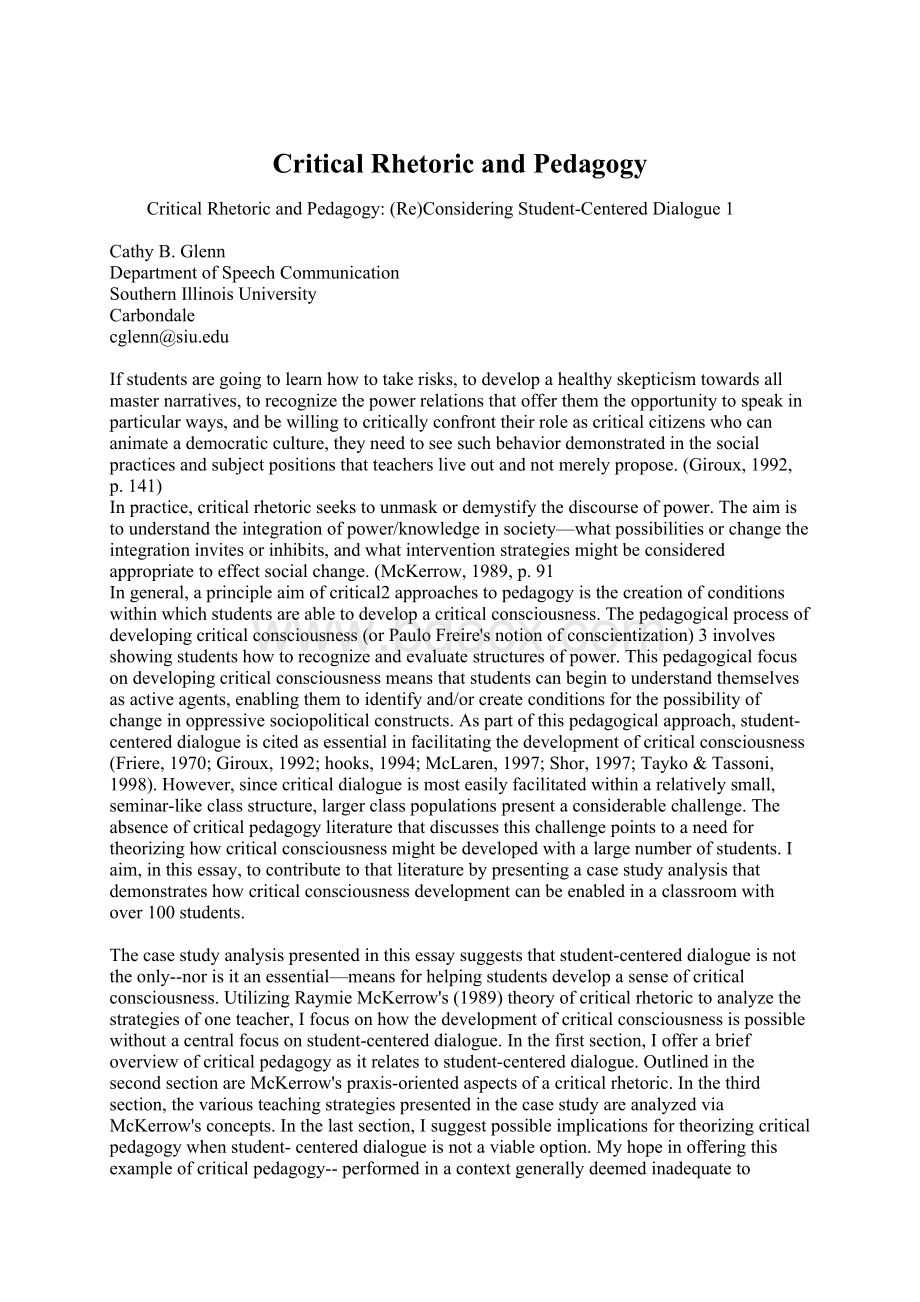Critical Rhetoric and PedagogyWord下载.docx
《Critical Rhetoric and PedagogyWord下载.docx》由会员分享,可在线阅读,更多相关《Critical Rhetoric and PedagogyWord下载.docx(17页珍藏版)》请在冰豆网上搜索。

Carbondale
cglenn@siu.edu
Ifstudentsaregoingtolearnhowtotakerisks,todevelopahealthyskepticismtowardsallmasternarratives,torecognizethepowerrelationsthatofferthemtheopportunitytospeakinparticularways,andbewillingtocriticallyconfronttheirroleascriticalcitizenswhocananimateademocraticculture,theyneedtoseesuchbehaviordemonstratedinthesocialpracticesandsubjectpositionsthatteachersliveoutandnotmerelypropose.(Giroux,1992,p.141)
Inpractice,criticalrhetoricseekstounmaskordemystifythediscourseofpower.Theaimistounderstandtheintegrationofpower/knowledgeinsociety—whatpossibilitiesorchangetheintegrationinvitesorinhibits,andwhatinterventionstrategiesmightbeconsideredappropriatetoeffectsocialchange.(McKerrow,1989,p.91
Ingeneral,aprincipleaimofcritical2approachestopedagogyisthecreationofconditionswithinwhichstudentsareabletodevelopacriticalconsciousness.Thepedagogicalprocessofdevelopingcriticalconsciousness(orPauloFreire'
snotionofconscientization)3involvesshowingstudentshowtorecognizeandevaluatestructuresofpower.Thispedagogicalfocusondevelopingcriticalconsciousnessmeansthatstudentscanbegintounderstandthemselvesasactiveagents,enablingthemtoidentifyand/orcreateconditionsforthepossibilityofchangeinoppressivesociopoliticalconstructs.Aspartofthispedagogicalapproach,student-centereddialogueiscitedasessentialinfacilitatingthedevelopmentofcriticalconsciousness(Friere,1970;
Giroux,1992;
hooks,1994;
McLaren,1997;
Shor,1997;
Tayko&
Tassoni,1998).However,sincecriticaldialogueismosteasilyfacilitatedwithinarelativelysmall,seminar-likeclassstructure,largerclasspopulationspresentaconsiderablechallenge.Theabsenceofcriticalpedagogyliteraturethatdiscussesthischallengepointstoaneedfortheorizinghowcriticalconsciousnessmightbedevelopedwithalargenumberofstudents.Iaim,inthisessay,tocontributetothatliteraturebypresentingacasestudyanalysisthatdemonstrateshowcriticalconsciousnessdevelopmentcanbeenabledinaclassroomwithover100students.
Thecasestudyanalysispresentedinthisessaysuggeststhatstudent-centereddialogueisnottheonly--norisitanessential—meansforhelpingstudentsdevelopasenseofcriticalconsciousness.UtilizingRaymieMcKerrow'
s(1989)theoryofcriticalrhetorictoanalyzethestrategiesofoneteacher,Ifocusonhowthedevelopmentofcriticalconsciousnessispossiblewithoutacentralfocusonstudent-centereddialogue.Inthefirstsection,Iofferabriefoverviewofcriticalpedagogyasitrelatestostudent-centereddialogue.OutlinedinthesecondsectionareMcKerrow'
spraxis-orientedaspectsofacriticalrhetoric.Inthethirdsection,thevariousteachingstrategiespresentedinthecasestudyareanalyzedviaMcKerrow'
sconcepts.Inthelastsection,Isuggestpossibleimplicationsfortheorizingcriticalpedagogywhenstudent-centereddialogueisnotaviableoption.Myhopeinofferingthisexampleofcriticalpedagogy--performedinacontextgenerallydeemedinadequatetosupportsuchanapproach--istounderscorehowcriticalconsciousnessdevelopmentdoesnotdependonan.priorifocusonstudent-centereddialogue.
CriticalPedagogy&
Student-CenteredDialogue
Ingeneral,criticalpedagogy4hasbeendescribedasanapproachtoteachingthat,throughafocusonstudents'
interestsandidentities,attemptstomoveawayfromteacher-andtext-centeredcurricula.Bydrawingsubjectmatterfromstudents'
ownlives,language,andcultures,acriticalreadingofdominantsociopoliticalconstructsisincludedandsituatedwithinstudents'
experiencestoprovideasociohistoricalcontextfromwhichtoenvisionandenactsocialchange(Friere,1970;
1998;
Shor,1997).Inshort,criticalpedagogyaimsatdevelopingstudents'
criticalconsciousness.Eventhoughthespecificmeansengagedtodosovaryamongpedagoguesinthisarea,affordingaprivilegedstatustostudent-centereddialogueisafamiliartheme.
Theadvantagesofcriticaldialogueintheclassroomhavebeenafocalpointinrecenteducationaltheoryandresearchandmuchhasbeenwrittenexplicatingthetransformativepotentialofincludingastudent-centereddialogicaspectincriticalapproachestoteaching(Arnett,1993;
Boler,1997;
Conle,1997;
Friere,1987,1997;
hooks1994;
McHenry,1997;
Popkewitz,1997;
Schutz,1998).Thesescholarspointtotheconstitutiveaspectsofdialogueastheprimarymeansforhelpingstudentsdevelopanawarenessoftheiragencyinaffectingchangeinoppressivecircumstances.Performingascriticallythinkingandspeakingsubjectsintheclassroomprovides,forstudents,thebasisforperformingascitizen-criticsoutsideit,aswell(Giroux,1992).Scholarshaveaddressedhowdialoguecanofferstudentsanopportunitytorehearsesocialcriticism(Andrews,1989;
Foss,1989;
Fry,1986),howsocioculturalandidentityissuescanbetreatedduringdialogicprocesses(Braithwaite,1997;
Kidd,1989;
Strine,1993),andhowissuesrelatedtogenderandsexualorientationcanbecriticallyengagedwhendialogueisstudent-centered(Campbell,1991;
Jenefsky,1996;
Wood&
Lenze,1991;
Yep,1998).Itseemsclearfromtheseaccountsthatstudentsbenefitwhentheyareofferedopportunitiestoengageincriticaldialoguewithpeers.
Whileacknowledgingthevalueofastudent-centeredapproachtodialogicpedagogy,anequalacknowledgementofthecontingenciesofinstitutional,sociopolitical,andideologicalconstraintsmustbeconsideredalongsidetheaimsofacriticalapproachtoteaching(Boyd,1999;
Burbules,2000;
Gur-ze'
ev,1998;
Lather,1998)5.Oneofthoseinstitutionallimitationsisclasssize,anaspectofclassroomorganizationthatisrarely,ifever,apartofthescholarlydiscussionofstudent-centereddialogue.Itshouldgowithoutsayingthateachclassroomcontextisuniqueandeachintrinsicallypossessesitsownpromiseandpotential;
ontheotherhand,eachalsopresentsdistinctivecontextualchallenges(Glenn,1999b).Thisrecognitionofcontextcontingency--specificallyasitrelatestothenumberofstudentsinaparticularclass--isnonexistentinscholarshipadvocatingacriticalapproachtoteachingthatutilizeslearner-centereddialogueasthemeanstoattaincriticalconsciousness.
Facilitatingcriticaldialogueisnotaneasytask,evenwitharelativelysmallnumberofstudents;
itisacomplicatedprocess--usuallyamongonefacilitator-teacherandmanystudents—thatrequiresconstantcommunicative(re)negotiation(Glenn,1999a).Forthosecriticalpedagogueswhofindthemselvesinthecontextofalargeclassroom,thatcommunicationprocessbecomesnearlyuntenable.Itiscrucialforthoseteachers,then,todevelopspecific,situated,andlocalizedstrategiesinordertoretainthecriticalcharacteroftheirteachingapproachwhileadjustingtheirteachingstrategiestoaccommodatealargenumberofstudents.Dr.MichelleWolfisonesuchteacher,andthisstudyrepresentsastartingplacefortheorizingthosestrategiesemployedinherclassroom.
Dr.WolfwasoneofmyprofessorswhenIwasanundergraduatestudentatSanFranciscoStateUniversity(SFSU),andherteachingapproachleftanimpressiononmethathasendured.Dr.Wolfis20-yearfacultymemberintheDepartmentofBroadcastandElectronicCommunicationArts(BECA);
shecompletedherM.A.inCommunicationStudiesattheUniversityofMassachusettsandherPh.D.inCommunicationTheory--withaMassCommunicationsandEducationalPsychologyemphasis--attheUniversityofTexasatAustinbeforecomingtoCalifornia.Dr.Wolfhasbeenteachingfor25years.Beingapartofherclass“SocialAspectsofElectronicMedia”(BECA422)wasamemorableexperienceformeasanundergraduate;
herprovocativestyleandinherentlycriticalmodeofteachingwasalwaysengaging.Thetheoreticalmaterialintroducedinclasswasinterspersedwithfrequentlyaffective,sometimesgraphic,andalwayscontroversialmedia;
and,theseculturalfragmentswereofferedwithahealthymeasureofDr.Wolf'
sownsocioculturalcritique.EventhoughIregularlyfoundmyselfdisagreeingwithparticularpositionsshetookinthecourseofintroducingthematerial,herobviousenthusiasmfor,commitmentto,andengagementwithstudentsandteachingfacilitatedawelcomingclassroomenvironmentthatinvitedcriticalexplorationofthecoursematerialinconnectionwiththelifeexperiencesweallbroughttothetable.ChoosingtostudyDr.Wolf'
spedagogicalstyleforthisprojectwasmotivatedbymyowninterestincriticalapproachestopedagogy,approachesIassumednecessitatedacentralfocusonstudent-centereddialogueasthewaytofostercriticalengagement.Initially,Iviewedtheprojectasanopportunitytolearnhowtofacilitateacriticaldiscussionwithalargenumberofstudents(over100)fromateacherwhosecriticalperspective,likemine,alsoinformsherpedagogy.Ilearnedduringthecourseofthisproject,however,thatmyownpresuppositionsaboutcriticalpedagogy—significantlyinfluencedbythoseassumptionsfoundinmuchoftheliterature--wereinneedof(critical)reconsideration.Inthefollowingsection,Iofferabriefsketchofthetheoreticalframeworkwithinwhichthosereconsiderationsaresituated.
CriticalRhetoric
RaymieMcKerrow(1989)describescriticalrhetoricasapracticeandtheoreticalenterpriseencompassingdivergentcriticalprojects